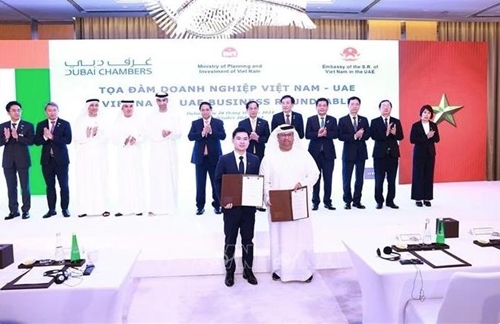The diplomat noted that Vietnam and the UAE saw notable progress in their relations in 2024, with an increasing number of major UAE companies expressing interest in seeking partnerships with their Vietnamese counterparts.
    |
 |
|
Prime Minister Pham Minh Chinh witnesses the handover ceremony of cooperation agreements between Vietnamese and UAE enterprises. |
Highlighting major achievements in the bilateral ties in 2024, he cited the successful official visit of Prime Minister Pham Minh Chinh to the UAE in October, which marked the beginning of a new phase in economic, trade, and investment cooperation. The two countries upgraded their relationship to a Comprehensive Partnership, signed the Comprehensive Economic Partnership Agreement (CEPA), and set the ambitious target of reaching a trade turnover of 20 billion USD. This agreement also opens up significant potential for expanding Vietnam’s trade with the broader Middle East, he said.
Two-way trade in 2024 is expected to exceed 6.02 billion USD, a robust increase of 28.33% compared to 2023. Vietnamese exports to the UAE saw a substantial rise, with a trade surplus estimated at 4.48 billion USD. The two sides signed 13 investment and business agreements in various fields, including artificial intelligence (AI), energy transition, infrastructure development, logistics, finance, agriculture, and locality-to-locality collaboration, noted the ambassador.
He said that Vietnam and the UAE held business forums with hundreds of companies in attendance. Vietnamese businesses actively participated in the Vietnam Week at Lulu Hypermarket in Dubai, the Gulfood trade fair in February, and the World Organic and Natural Products Expo in November.
Regarding cooperation prospects for 2025, Diep said that following PM Chinh's visit, the UAE has shown increased interest in advancing ties with Vietnam. The UAE's Ministry of Investment and several large corporations have planned visits to Vietnam to explore further cooperation. The CEPA, the first free trade agreement Vietnam has inked with an Arab country in the Middle East and Africa, will open up significant prospects for strategic cooperation across a range of sectors.
He forecasted that in 2025 and beyond, cooperation in trade, investment, industry, energy, renewable energy, logistics, agriculture, infrastructure, high-tech, digital transformation, green transition, innovation, and labor would accelerate under the CEPA framework. Security, defense, culture, education, tourism, and people-to-people exchanges will also continue to grow in line with the Comprehensive Partnership between the two nations, the ambassador said.
Diep described it as a unique market. Due to insufficient domestic production to meet consumption needs, the UAE relies heavily on imported goods, which creates opportunities for Vietnamese products. However, the market is highly competitive. Vietnam faces several challenges compared to other countries, such as higher transport costs due to the long distance, as well as differences in demand, culture, language, consumer preferences, and business customs. Moreover, most Vietnamese food and beverage products lack Halal certification. The influence of South Asian countries, such as India and Pakistan, is also substantial, given their large communities in the UAE and shared cultural ties. Retail in the UAE is predominantly controlled by Indian and South Asian businesses, he noted.
In this context, the diplomat outlined several strategies for Vietnamese enterprises to maximize the benefits of the CEPA and successfully enter the UAE market. He advised Vietnamese businesses to thoroughly research and understand the local market, consumer preferences, culture, and business customs, while targeting the right customer segments with competitive and differentiated products. It is also essential to familiarize themselves with legal regulations, business practices, import-export rules, quality standards, and customs procedures.
The ambassador also highlighted the importance of enhancing product marketing by participating in major international trade fairs and exhibitions in the UAE, such as Gulfood, Arab Health, and GITEX, to reach potential partners and customers. Given the high internet and social media penetration in the UAE, Vietnamese companies should leverage digital marketing and online strategies to promote their brands and engage with potential customers.
Furthermore, he stressed the need to continually improve product quality, innovate, stay updated with trends, and optimize distribution and logistics networks to reduce costs and improve competitiveness in the highly dynamic UAE market. The diplomat emphasized the importance of building long-term relations and a strong network of partners and customers, as the UAE’s business culture places a significant focus on personal connections.
Source: VNA